Analysis: Who voted for Trump in Iowa – and who didn't
Voters ready for New Hampshire primary
Former President Donald Trump scored a record-setting win in the Iowa caucuses on Monday with his rivals languishing far behind, a victory that affirmed his grip on the 2024 Republican presidential nomination. Now, candidates head to New Hampshire for a primary vote.
Donald Trump notched a commanding win in the Iowa GOP caucuses, more than doubling the 24% support he received in 2016. Caucusgoers braved subzero temperatures to deliver a resounding victory for the former president, whose 30-point win was the largest for a contested presidential caucus in modern Iowa history.
That’s according to our Fox News Voter Analysis of Iowa Republicans.
Florida Gov. Ron DeSantis edged out former South Carolina Gov. Nikki Haley for second place. The result was a much-needed boost for DeSantis, who visited every county and invested significant time and resources in the Hawkeye State.
Businessman Vivek Ramaswamy finished far behind with single-digit support, dropping out and endorsing Trump as the results became clear.
VIVEK RAMASWAMY ENDS PRESIDENTIAL BID FOLLOWING IOWA CAUCUSES
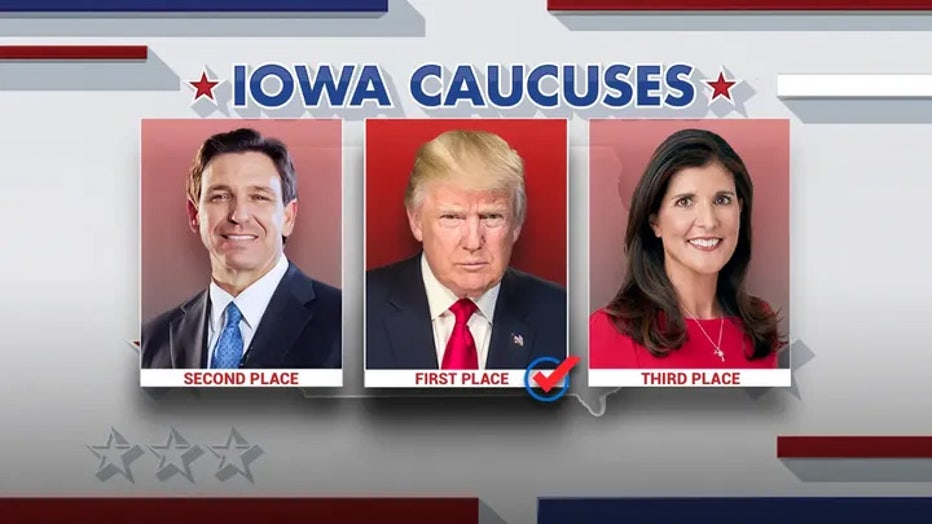
Former President Trump came out of the Iowa caucuses victorious followed by Florida Gov. Ron DeSantis and former South Carolina Gov. Nikki Haley. (Fox News)
Underscoring the extent of his dominance, Trump won almost every demographic group by double-digit margins. He was particularly strong among some of the largest groups of Iowa Republican caucusgoers: those without a college degree, very conservative voters and rural voters.
Trump won 55% of White evangelical Christians, a crucial bloc of Iowa voters, more than double DeSantis’ 24% and Haley’s 13%.
More than 6 in 10 caucusgoers consider themselves supporters of the Make America Great Again movement, and most of them (74%) backed Trump. In a hint of the next challenge for Trump – ensuring the full party is united behind him if he wins the nomination – non-MAGA voters backed Haley by 8 points, with DeSantis second.
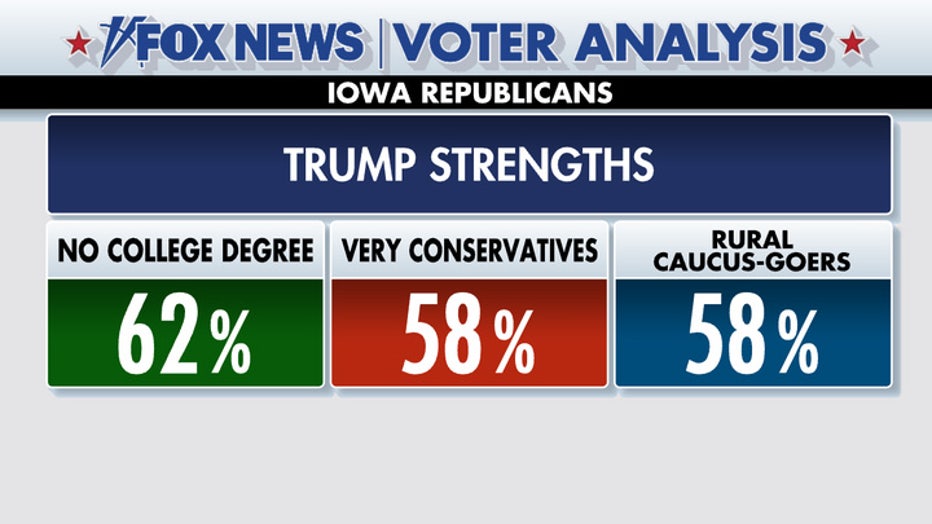
DeSantis’ main sources of strength – the college-educated, very conservative voters and suburbanites – overlapped with both Haley’s and Trump’s. While he did not win any major demographic group outright, his advantages over Haley among White evangelicals (+11 points) and those who felt abortion should be illegal in all cases (+30 points) were enough to vault him into second place.
Haley ran strongest among college graduates, suburban voters and political moderates. Despite her pro-life record, Haley had a notable 22-point advantage over DeSantis among voters who felt abortion should be legal in all or most cases.
The final few days of campaigning may have been decisive in the battle for second place, as DeSantis had an 8-point edge over Haley among those who made up their minds in the last few days. Trump held a massive 73-point advantage among those who knew who they would support all along.
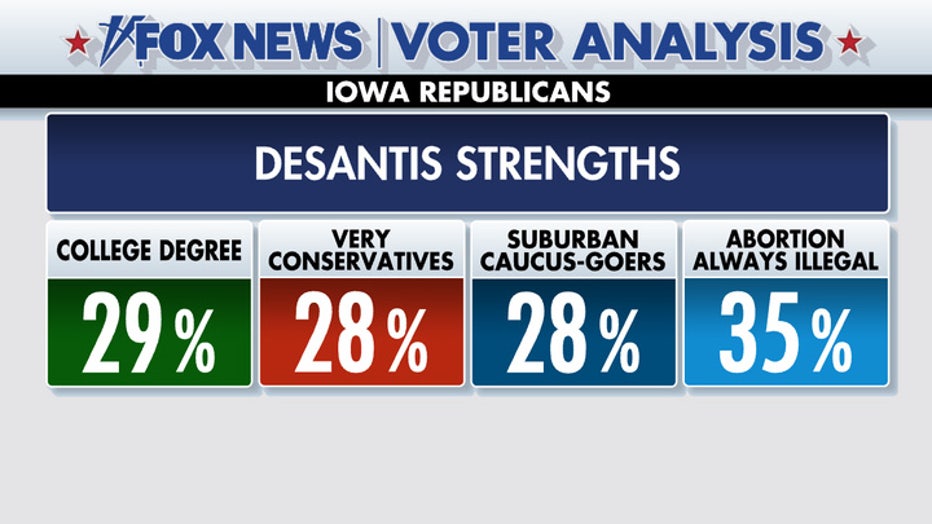
DeSantis had a 7-point advantage over Haley among those who had participated in previous caucuses, while first-time caucusgoers backed the South Carolinian by 8 points. Still, Trump won the lion’s share of first-timers (51%) and those who caucused in years past (51%).
WATCH: DESANTIS DELIVERS HOPEFUL MESSAGE AFTER IOWA
Overall, 6 in 10 caucusgoers would be satisfied with Trump as the party’s eventual nominee. Far fewer would be satisfied with DeSantis or Haley.
At the other end of the spectrum, 2 in 10 (20%) would be dissatisfied enough with Trump as the nominee that they would not pull the lever for him in November. Slightly more would not vote for DeSantis (26%) or Haley (30%) if they were the nominee.
Despite his resounding win, Trump has some work to do to unite the party in November. If he is the eventual nominee, two-thirds of Haley voters (68%) said they would be so dissatisfied that they would not support him. Fewer DeSantis supporters (25%) would refuse to back Trump.
WATCH: TRUMP'S FULL REMARKS TO IOWA SUPPORTERS
More than one-third of Haley (41%) and Trump (35%) voters would return the favor by declining to support DeSantis if he is the eventual nominee.
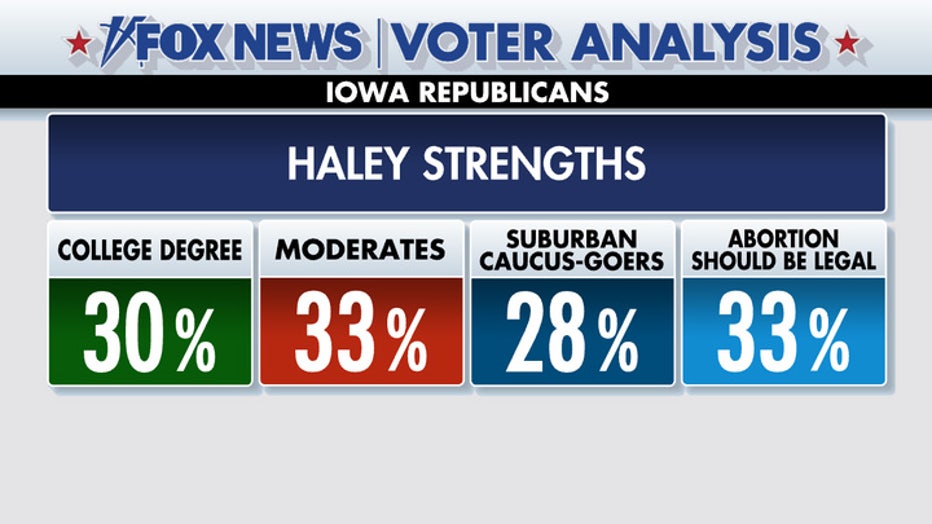
If Haley wins the nomination, nearly half of Trump voters (45%) and 2 in 10 DeSantis backers (19%) would not support her in November.
Regardless of their preferred candidate, voters’ top priorities for their nominee were near-universal: having the mental capacity to serve as president, followed closely by being a strong leader. Despite Haley’s efforts to question Trump’s stamina, those who prioritized mental capacity backed the former president by 28 points.
Being able to win in November, caring about people like you and having the best policy ideas were second-tier priorities but very important to at least three-quarters of voters. Half were looking for a candidate who would work across party lines.
Few – just 16% – thought it was very important to nominate a candidate willing to break the rules in pursuit of their accomplishments.
Despite the array of legal challenges he faces, most caucus participants did not think Trump is a law-breaker. Roughly 2 in 10 (15%) felt he did something illegal regarding the events at the U.S. Capitol on Jan. 6, 2021, in his alleged attempt to interfere with the vote count in the 2020 election (19%) or the classified documents found in his Florida home (21%).
All told, the one-quarter of voters who felt Trump was guilty of at least one criminal act went for Haley by 28 points, while Trump carried those who felt he hadn’t broken the law by an even wider 43-point margin.
Most caucusgoers felt the charges were political attempts to undermine Trump (80%) rather than legitimate investigations into wrongdoing (20%).
Perhaps as a result, only 4 in 10 said they had confidence in the integrity of the U.S. legal system.
More than half were confident in the integrity of elections nationwide and U.S. democracy in general, while almost all had confidence in Iowa’s electoral processes.
Reflecting their mistrust of U.S. elections, 6 in 10 voters felt Biden was not legitimately elected. Trump won these voters by a massive 54-point margin, while Haley won those who thought Biden was fairly elected by 21 points.
Republican caucusgoers were united in their desire for change in how the country is run – hardly surprising with a Democrat in the White House. The lion’s share (56%) would prefer substantial change, while one-third (33%) were looking for complete and total upheaval in the country’s governance. Trump had an advantage among those looking for substantial change, but those looking for complete upheaval turned the caucuses into a blowout.
Meanwhile, economic issues were also a driver of the desire for change. Most voters – 9 in 10 – said they were either holding steady or falling behind financially.
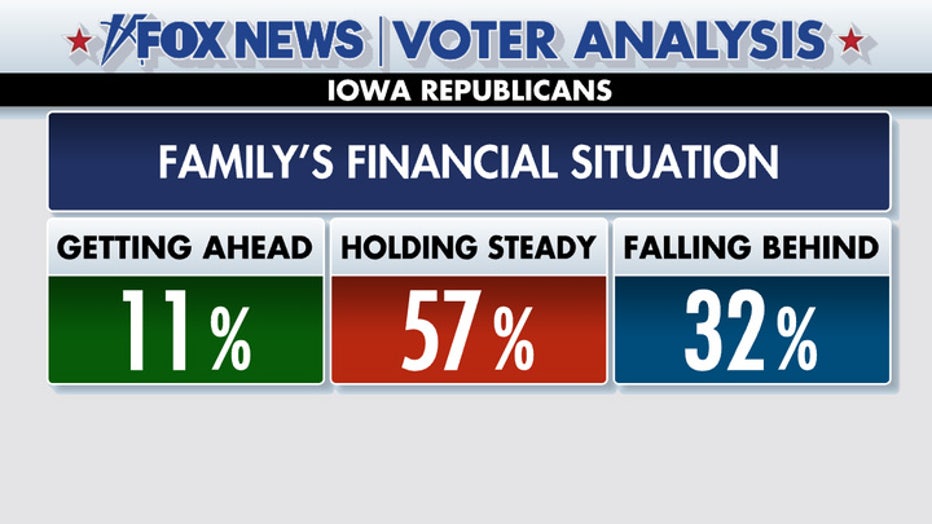
The economy was, predictably, among the top issues on voters’ minds, but more caucusgoers cited immigration as the top issue facing the country. These two issues dominated the issue landscape, with every other issue in single digits.
Trump won immigration voters by 36 points, and his signature immigration policy – building a wall along the southern border – was almost universally popular with Iowa Republicans.
Three-quarters of caucusgoers felt immigrants in the U.S. today do more to hurt the country than help it. Haley won by a sizable 21-point margin among those who feel immigrants generally help the country; Trump won by an even wider 39-point spread among the larger group who feel immigrants hurt the country.
Trump won economy voters by 33 points, thanks in large part to a 52-point edge among those who said they were falling behind financially. Voters who were breaking even financially backed him by 23 points, while the relatively small number who said they were getting ahead went for Haley by 13 points.
Foreign policy was far from the top of voters’ priority lists – just 7% said it was the most important issue facing the country – but it did provide a clear area of contrast between the candidates.
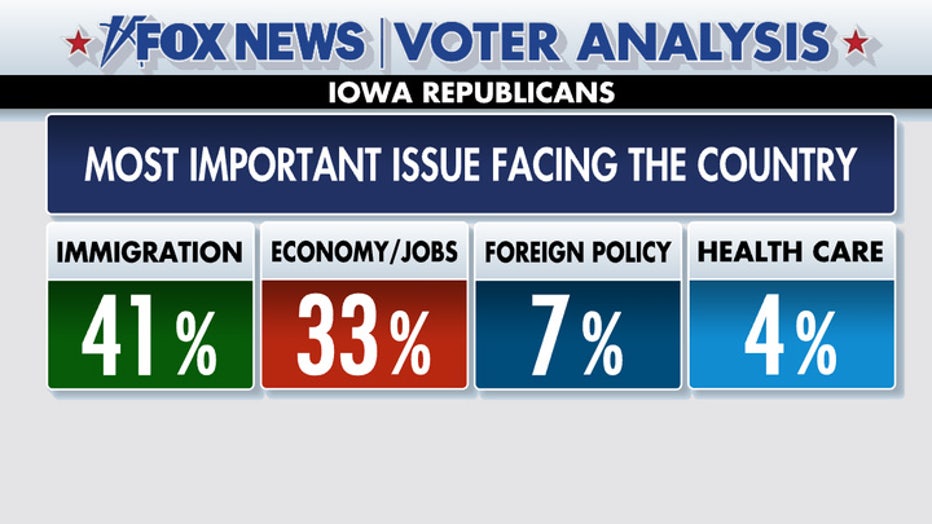
Four-in-ten voters preferred to continue aiding Ukraine in its war against Russia, and they favored Haley over DeSantis by 11 points. Trump won aid for opponents by 43 points.
WATCH: HALEY VOWS TO CONTINUE FIGHT AFTER THIRD-PLACE FINISH
There was more consensus on support for aiding Israel in its war against Hamas (67% support vs. 32% oppose). White evangelicals, who have traditionally been among the strongest U.S. supporters of Israel, backed continued aid by an even wider 54-point margin.
All told, a majority of caucusgoers felt the U.S. should take a less active role in world affairs.
School policy (3% most important issue) was an even lower priority than foreign policy, which hurt DeSantis, who sought to distinguish himself on the issue. Many Iowa caucusgoers agreed with the Florida governor in principle: 52% felt their local schools were too focused on racism, and three-quarters felt the same about lessons on sexual orientation (74%) and gender identity (76%). Unfortunately for DeSantis, he trailed Trump by nearly 30 points among those who felt schools were too focused on each issue.
While not a top priority for caucusgoers (3% most important issue), abortion is certain to be a major topic in the general election. Iowa Republicans largely felt abortion should be illegal in all (20%) or most cases (48%). Two-thirds backed a 6-week abortion ban (65% favor, 33% oppose), while far more were in support of a 15-week ban (78% favor, 20% oppose).
Methodology
The Fox News Voter Analysis is a survey of approximately 1,500 Iowa Republican caucusgoers conducted Jan. 9-15. Full methodological details are available here.

